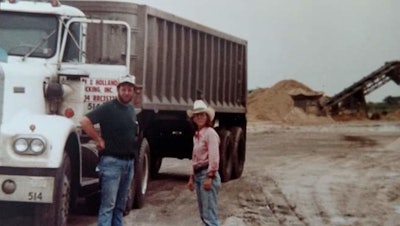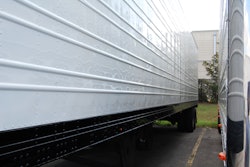
"It's always been in my blood."
--Sandra Jeanne Irwin about her long trucking career
Lazear, Colorado-based Sandra Jeanne Irwin learned commercial trucking starting in 1973 with a two-stick five and four transmission, hauling uranium ore out of Colorado at the height of the Cold War.
Fifty years later, something other than diesel in her blood all but ended the storied hauler's career, thanks to some misleading marketing and lax regulations around CBD. A pre-employment drug test popped positive for marijuana, and she's since struggled to find work.
Overdrive has warned of the dangers of CBD use when it comes to the risk of a failed drug test. It's a close relative of federally banned forms of THC, the active ingredient in marijuana.
[Related: Can truck drivers use CBD? All you need to know about cannabis, hemp, testing and the clearinghouse]
Yet CBD has shown itself to be effective for pain management without the addiction, overdose and despair risks associated with opioids. Some, especially older folks who have put a lot of miles on their body, swear by CBD as a miracle cure, and gas stations, smoke shops and corner stores all around the nation market the stuff as totally safe. Yet it's caused the downfall of an untold number of operators stuck "between a rock and a hard place" in the Federal Motor Carrier Safety Administration's Drug and Alcohol Clearinghouse, as Irwin put it.

Irwin maintains she's never done a drug in her life, but after decades as a flatbedder, and 30 years as an owner-operator, throwing chains and tarps has wreaked havoc on the 76-year-old's body. Like millions of other Americans, Irwin turned to CBD for help. Unlike most, Irwin had DOT drug tests to pass.
In late November 2022, Irwin was looking for a new challenge in trucking, saying she frequently got "bored" within one or another of trucking's many niches. She was looking for "drive away" jobs, piloting new cars and trucks to dealers and/or buyers over-the-road. She took two pre-employment drug screens in a single day. One came back negative, as such tests always did for her.
Yet the other, taken just hours later, came back positive for THC metabolites.
It's important to note that THC metabolites are different than THC. A driver, or any person, never even has to consume psychoactive, federally illegal THC molecules for the body to produce THC metabolites. (Concentrated THC derived from legal hemp plants is technically legal today, complicating matters, and often sold as Delta-8 and Delta-10 THC.) Scientific literature, too, reflects divisions on the question of whether pure CBD can metabolize into THC metabolites.
Irwin maintains that she's never knowingly used THC, or anything other than CBD. Even with one clean test hours earlier, her positive test sent her career into a tailspin.
After the positive test, she had to complete FMCSA's Return to Duty program by working with a Substance Abuse Professional during which she completed a questionnaire. It included questions like "how long have you been a drug user," she said, which she found "demeaning."
"They made me feel about two inches tall," she added. "I take CBD for the bone-on-bone in my knee."
She paid $400 for the SAP work, then $80 for a required 15-hour course. And she'll live under a random testing regime that could see her taking observed pee tests two to five times a year for the next five years. "The SAP and the company I took the Return to Duty classes through said I wouldn't have any problem getting another CDLA job," she said. "That is the biggest bunch of BS I have ever been told."
Irwin says she still can't find a job that pays the bills.
Irwin's case likely echoes hundreds or thousands of others' lured in by the marketing of CBD, despite the DOT explicitly warning since 2020 that the "labeling of many CBD products may be misleading because the products could contain higher levels of THC than what the product label states." The "Food and Drug Administration (FDA) does not currently certify the levels of THC in CBD products; so, there is no federal oversight to ensure that the labels are accurate."
[Related: Trucking Law: When meds can sideline your commercial driving]
The FDA has cautioned the public to “beware purchasing and using any [CBD] products. ... It is currently illegal to market CBD by adding it to a food or labeling it as a dietary supplement.” Also, the FDA has issued several warning letters to companies because their products contained more CBD than indicated on the product label.
Irwin missed the memos. Over the last five or so years, she's relied on CBD products. Now, even with 50 years of driving experience, she's sunk to the lowest of the low among driver job applicants.
"I get turned down at least once a day when I fill out the applications," she said. "Sometimes these companies who do the hiring for the trucking companies are advertised as being SAP-friendly, or second chance-friendly when it comes to having a prison record. And then the special conditions creep in."
She put her quandary in stark terms. "Companies say I have to have completed a three-or five-year SAP program and then they'll hire me after an additional three years," she said. "I'll be dead by then."
The SAP program Irwin used said that none of their driver clients have trouble finding work after the program. To be clear, Irwin did find work at a Canadian company in the driveaway business, but she noted it pays a paltry 40 cents per mile and will not support her.
Irwin's SAP admitted to sometimes playing "devil's advocate" when assessing drivers in the program, but denied the questions were "demeaning," even if they're being asked of someone who has never used drugs.
An FMCSA rep said that "any impediments to drivers obtaining employment after the RTD process are the result of employer policies, possible insurance restrictions, and/or market conditions, not U.S. DOT/FMCSA restrictions."
Irwin's on her own.
She grew up on a farm in Colorado. Like many in trucking, she got her start driving tractors and farm equipment around the family's land. "I can still remember sitting out on the porch when I was in third grade," she said, "and a Kenworth would run up and down our road to fuel in Lazear. I knew the guy, and I used to live for seeing his KW go down to fuel. He'd honk the horn at me.
"I don't know why it always fascinated me."
Despite going to college to please her parents, she quickly found herself leaving school without a degree and getting behind the wheel of a truck.
Stepdecks, lowboys, RGNs -- a lifetime of trucking experience was built as the nation built itself. She went out on her own as an owner-operator for 30 years before seeking employment to help boost a retirement nest egg, hard as that can be. Today, she says going out as an owner-operator again doesn't look like it's in the cards, considering rates and that her own truck needs about $25,000 worth of engine work to get back to working condition.
She's in a "Catch 22 situation," she said, with Congress legalizing CBD derived from legal hemp but making every gas station counter in America a minefield for the professional driver and her continued work to return to duty -- when that line of duty might no longer have a place for her.
As she struggles to find work, the Women of Trucking Advisory Board wonders how to recruit and retain more women in the trucking industry. Irwin is the real deal, one of the proud few women who've heard trucking's call and answered. Thanks to the confusion kicked up by CBD legalization and lack of regulatory clarity around the substance, for now it looks like a career spent chasing the kind of glory on the open road only pro drivers know may come to an unceremonious end.
[Related: CBD: One trucker's answer to chronic pain, opioid addiction]










